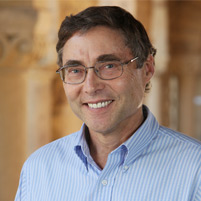Nobel Laureate Carl Wieman

Carl Wieman
Nobel Prize laureate Carl Wieman learned early on about the importance of learning-by-doing in his chosen field of physics. As an undergraduate at the Massachusetts Institute of Technology he avoided taking traditional classes so he could spend as much time in the lab as possible.He then took the next step of quite literally moving in.
"After a while, I had this laboratory of my own, and I spent all my time there, so it seemed kind of silly to be paying for a dorm room," he recently told The Stanford Daily.
Unconstrained by conventional thinking, Wieman champions a radical, evidence-based approach for improving learning outcomes, and he has made it his life's mission to change the instructional paradigm for the STEM (science, technology, engineering, and mathematics) fields.
Wieman was the first speaker to visit CMU in support of The Simon Initiative, announced in November by President Subra Suresh. The initiative is designed to accelerate the university's pioneering research into the science of learning.
His lecture, "Taking a Scientific Approach to Science Education," took place Jan. 31.
Wieman's policy work, academic background and approach to education also makes him keenly qualified to join CMU's Global Learning Council, which includes thought leaders from academia, industry and major foundations in the United States and around the world, who share the mission of improving learning outcomes.
The group, convened by President Suresh, will help set standards, share best practices and advocate for new education delivery models developed through the science of learning.
President Suresh reasoned that for The Simon Initiative to have the greatest impact, it made sense to bring others with experience and an interest in the subject to the table.
While serving as director of the National Science Foundation, President Suresh crossed paths with Wieman. In 2010, the physicist was the associate director of science for the White House Office of Science and Technology Policy. In that role, Wieman advocated for new methods of teaching science in the nation's high schools and universities.
He left Washington last summer for a joint appointment as professor of physics and of the graduate school of education at his alma mater, Stanford University.
Wieman began his academic career as a professor at the University of Colorado at Boulder, where research with two colleagues on the Bose-Einstein condensate led them to share the 2001 Nobel Prize in Physics.
After winning the Nobel Prize, Wieman's interests turned to improving science education. While still in Colorado, he developed a website that provides interactive simulations of physics concepts.
In 2007 Wieman moved to The University of British Columbia to start the Carl Wieman Science Education Initiative, where he worked to change the culture of teaching at the university, helping eight different departments move away from traditional lectures to more hands-on and interactive methods.
"Rigorous research on how students learn in actual courses is critical to improving education, but we don't have enough of it. Carl Wieman is helping to fill that gap and inspiring others to do the same," said Marsha Lovett, professor of psychology and director of the Eberly Center for Teaching Excellence and Educational Innovation at CMU.
Related Links: The Simon Initiative | Inaugural Simon Initiative Lecture
